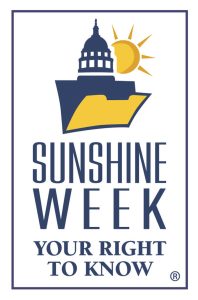|
Only have a minute? Listen instead
Getting your Trinity Audio player ready...
|
It’s never been easier to access information; we can simply tap our phones and open uncountable amounts of information through the internet. Of course, it’s just as easy to post information as it is to read it, and people have used the resource to spread information that isn’t true, either by accident or by design.
The problem has become so bad that an entire industry has blossomed of people and organizations who fact check statements, both spoken and written.

In this atmosphere, free and objective news media are more important than ever — and, unfortunately, they’ve also increasingly become targets for those who don’t want the truth to be known.
From presidents down to local officials, political operatives have fought efforts to keep public information public.
It’s a never-ending battle, one that’s highlighted every March during Sunshine Week. This year it runs March 10-16. Timed to coincide with the March 16 birthday of James Madison, the “Father of the Constitution,” it began as Sunshine Sunday, a campaign by the Florida Society of Newspaper Editors to raise awareness to many state officials’ efforts to weaken public information laws. The American Society of Newspaper Editors made it a weeklong, nationwide event in 2005, and over the years it has drawn support from several organizations — news outlets, civil rights advocates and others — that recognize the need to maintain public access to information so that they might know what their elected officials are doing and how their tax dollars are being spent.
Sunshine Week draws its name from a famous 1913 essay by Supreme Court Justice Louis Brandeis about the need for public access to government information.
“Publicity is justly commended as a remedy for social and and industrial diseases,” he wrote. “Sunlight is said to be the best of disinfectants; electric light the most efficient policeman.”
It’s no surprise, then, that corrupt officials constantly seek to turn off the light of public scrutiny that can expose their misdeeds. Those efforts are increasingly evident, from officials trying to exempt growing amounts of data from open records laws to politicians’ statements trying to weaken public trust in legitimate news reporting.
The need to continue fighting those efforts should be just as evident, as much in the Rio Grande Valley as anywhere else.
Just think of the dozens of Valley officials who have been convicted of crimes ranging from drug dealing to bribery and bid rigging, among other misdeeds. Imagine how many of those crimes might never have been discovered, and how many people might have escaped justice, if diligent reporters — and private residents as well — hadn’t used public records to uncover officials’ malfeasance. Imagine how much more of taxpayers’ money might have been lost if the officials had enjoyed the impunity that comes from public ignorance.
Let us all pledge this Sunshine Week to support efforts to maintain the public’s right to know what’s going on in government.
Public knowledge of government operations is the best way to help ensure honesty and accountability. This Sunshine Week, let us appreciate those who fight to keep the light of scrutiny burning.




